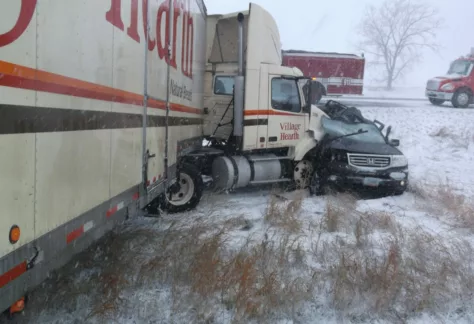In response to issues raised by the group Advocates for Highway and Auto Safety, the Federal Motor Carrier Safety Administration (FMCSA) is considering revising federal regulations to require new trucking companies to pass a proficiency exam before being allowed to begin operations. According to Henry Jasny, general counsel for the Advocates, the new exam, announced in an August 25, 2009 notice in the Federal Register, would help reduce truck accidents by increasing “the level of safety knowledge and operating safety on the roads.” The proposal marks the first major regulatory action under the Obama administration.
Current trucking regulations, finalized under the Bush administration, call for a safety audit of new trucking companies within their first 18 months of operation. Companies failing to comply with any of 16 federal safety rules would be shut down under those existing regulations.
FMCSA spokesman Duane DeBruyne says that the exam would be a good complement to the approximately 40,000 safety audits that are already conducted on new entrants each year by the agency and its partners. Of new entrants, DeBruyne says, “the majority are small operators of between one and five trucks”, but that in some cases larger firms would be subject to the new regulations. For example, anyone from outside the trucking industry who purchased a trucking company would be considered a new owner and would be required to take the proposed exam.
The inclusion of an entrance exam in the application process for new companies has been considered at least as early as 2006. Former FMCSA Administrator John Hill stated in a recent interview with industry news provider Transport Topics that during his tenure as FMCSA head, officials felt “there [needed] to be a little bit higher bar to entry” for new truck companies. “So, we thought maybe an entrance exam … could achieve that,” Hill said. The entrance exam, Hill stated, could not be incorporated into the final rule in 2006 because of time pressures.
It was in response to the lack of a proficiency exam in that 2006 final rule, along with other concerns such as hours of service and Mexican trucks, that Advocates for Highway and Auto Safety took action. They filed a petition with FMCSA requesting that consideration be given to including a proficiency exam in subsequent versions of the rule. FMCSA spokesman DeBruyne acknowledges that in proposing the exam the FMCSA is responding “to issues raised by” the Advocates’ petition.
Referrals & Co-Counsel
Involved in a Crash?
No other law firm knows trucks quite like us. Our trucking law expertise and trial experience allow us to win multi-million-dollar results year after year.
Our team of truck accident attorneys works tirelessly to help your family find justice in the wake of a catastrophic truck crash.
Referrals & Co-Counsel
No other law firm knows trucks quite like us. Our trucking law expertise and trial experience allow us to win multi-million-dollar results year after year.
Involved in a Crash?
Our team of truck accident attorneys works tirelessly to help your family find justice in the wake of a catastrophic truck crash.
The FMCSA said in its August 25 notice that it is seeking “information concerning issues that should be considered in the development and use of such an examination.” However, in developing a proficiency exam, the agency will not have to reinvent the wheel. Dave Osiecki, vice president of safety, security and operations with American Trucking Associations (ATA) notes that “there are exams and courses in the marketplace that might serve as models” for an FMCSA exam.
Jasny is happy with the proposed exam, and for good reason. Knowledge of proper safety measures can go a long way in the effort to reduce the number of truck accidents on our roads. New companies should be required to demonstrate knowledge of and adherence to those safety measures. As Jasny said, “It’s important to do some screening of new entrant motor carriers and what their familiarity is with the rules and regulations, rather than have people just starting up and learning as they go along. That kind of experiment on our highways is unsafe.”
Agreed.


